外研版八年级英语上册语法知识点汇总
外研版八年级上册英语知识点归纳
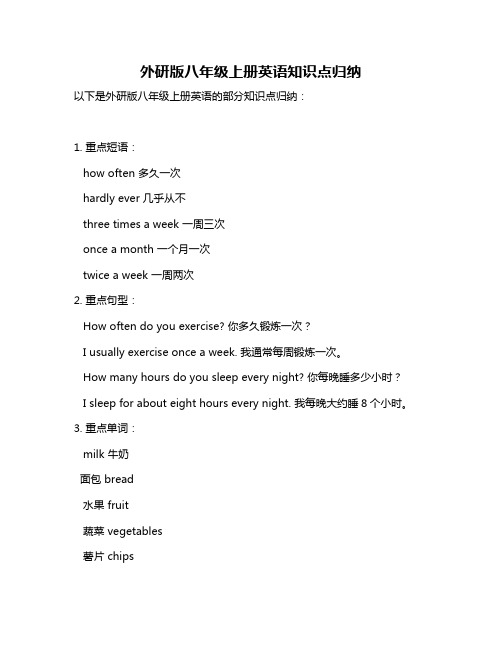
外研版八年级上册英语知识点归纳
以下是外研版八年级上册英语的部分知识点归纳:
1. 重点短语:
how often 多久一次
hardly ever 几乎从不
three times a week 一周三次
once a month 一个月一次
twice a week 一周两次
2. 重点句型:
How often do you exercise? 你多久锻炼一次?
I usually exercise once a week. 我通常每周锻炼一次。
How many hours do you sleep every night? 你每晚睡多少小时?
I sleep for about eight hours every night. 我每晚大约睡8个小时。
3. 重点单词:
milk 牛奶
面包 bread
水果 fruit
蔬菜 vegetables
薯片 chips
糖果 sweets
饮料 drink
4. 语法重点:频率副词和一般现在时的结合使用。
5. 学习策略:通过语境学习语法和词汇,利用语篇来提高语言运用能力。
6. 文化意识:了解不同国家的饮食和生活习惯,增强跨文化交流意识。
希望这些知识点能对你有所帮助,建议查阅外研版八年级上册的英语课本或教辅,获取更全面和准确的信息。
八年级外研版英语上册语法知识点总结与归纳
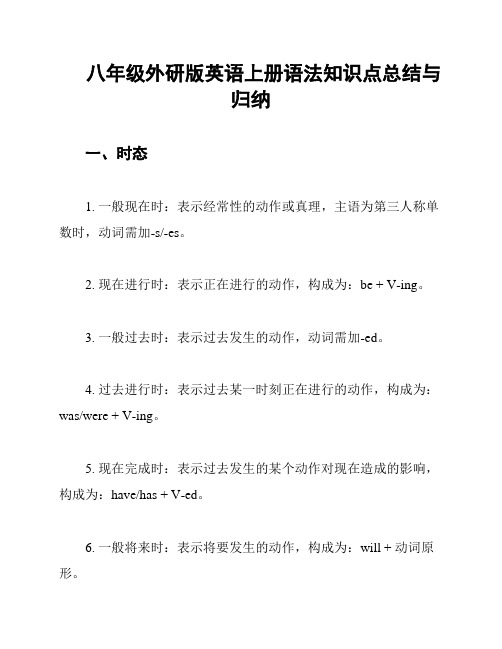
八年级外研版英语上册语法知识点总结与归纳一、时态1. 一般现在时:表示经常性的动作或真理,主语为第三人称单数时,动词需加-s/-es。
2. 现在进行时:表示正在进行的动作,构成为:be + V-ing。
3. 一般过去时:表示过去发生的动作,动词需加-ed。
4. 过去进行时:表示过去某一时刻正在进行的动作,构成为:was/were + V-ing。
5. 现在完成时:表示过去发生的某个动作对现在造成的影响,构成为:have/has + V-ed。
6. 一般将来时:表示将要发生的动作,构成为:will + 动词原形。
7. 现在完成进行时:表示过去开始进行的动作一直持续到现在,并可能持续下去。
构成为:have/has been + V-ing。
二、被动语态1. 被动语态的构成为“be + 过去分词”,被动语态的主语通常是动作的承受者。
2. 被动语态的时态和语态都可以通过助动词“be”加以表示。
三、情态动词1. 情态动词共有9个:can, could, may, might, must, shall, should, will, would。
2. 情态动词用于表示说话人的态度、感情或是某种推测,通常搭配动词原形使用。
四、关系代词1. who/whom:指人,作主语用who,作宾语或补语用whom。
2. whose:指人或物,表示所有关系。
3. that:指人或物,作主语、宾语、表语、定语等,引导限制性定语从句。
4. which:指物,作主语、宾语、表语、定语等,引导非限制性定语从句。
五、虚拟语气1. 虚拟语气用于表示现在或将来的假设情况或与过去相反的情况。
2. “if”引导的虚拟条件句中,主句通常要使用情态动词;与过去相反的虚拟语气要使用“were”。
六、倒装句1. 完全倒装:将助动词或情态动词提到主语前,用于表示强调或出乎意料的语气。
2. 部分倒装:将助动词、情态动词、系动词等提到主语前,用于表示疑问、否定、祝愿等语气。
最新外研版英语八年级上册知识点总结(精华版)
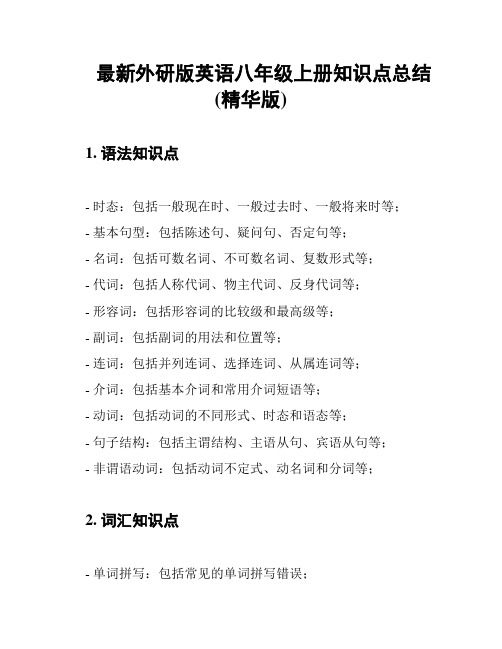
最新外研版英语八年级上册知识点总结
(精华版)
1. 语法知识点
- 时态:包括一般现在时、一般过去时、一般将来时等;
- 基本句型:包括陈述句、疑问句、否定句等;
- 名词:包括可数名词、不可数名词、复数形式等;
- 代词:包括人称代词、物主代词、反身代词等;
- 形容词:包括形容词的比较级和最高级等;
- 副词:包括副词的用法和位置等;
- 连词:包括并列连词、选择连词、从属连词等;
- 介词:包括基本介词和常用介词短语等;
- 动词:包括动词的不同形式、时态和语态等;
- 句子结构:包括主谓结构、主语从句、宾语从句等;
- 非谓语动词:包括动词不定式、动名词和分词等;
2. 词汇知识点
- 单词拼写:包括常见的单词拼写错误;
- 同义词:包括一些常见的同义词辨析;
- 常用短语:包括日常交际中常用的短语;
- 常用惯用语:包括一些惯用语的正确使用;
3. 阅读技巧
- 阅读理解:包括快速阅读和细节理解;
- 阅读速度:包括提高阅读速度和理解能力的方法;
- 阅读技巧:包括推测词义、寻找关键词等技巧;
4. 写作技巧
- 书信写作:包括格式、语言表达和常用句型等;
- 日记写作:包括表达个人感受和经历的方法;
- 作文写作:包括如何组织思路和提高写作水平的方法;
以上是最新外研版英语八年级上册的知识点总结,希望对你的研究有所帮助。
八年级上册英语外研版知识点

八年级上册英语外研版知识点一、重点短语1. how far 距离多远2. take the bus 乘公共汽车3. get to school 到校4. spend time 花时间5. go to the zoo 去动物园6. the more,the better 越多越好7. come true 实现8. have a good time 玩得开心9. look like 看起来像10. be ready 准备好了11. would like to do sth 想要做某事12. as a result 结果13. too…to 太……而不能14. on the one hand 在一方面15. be/get ready for 对……做好准备16. in the middle of 在……中间17. make/let sb do sth 让某人做某事18. on the weekend 在周末19. be able to 能够20. be afraid of 害怕21. have a good/bad day 过得开心/糟糕22. be careful 当心,小心23. be covered with 被……覆盖24. be famous for 因……而著名25. be full of 充满……的26. feel/seem/look+adj 看起来……27. in the sky/on the ground 在天上/在地上28. in the future 在将来29. in the sun 在阳光下30. be sure to do sth 确定做某事31. of course 当然了32. on fire 着火33. be late for迟到34. on time准时35. go shopping去购物36. be different from与……不同37. be similar to与……相似38. have a picnic野炊39. much too太……40. instead代替;反而,却41. none一点儿也没有,毫无42. all day整天,一整天,一整天;整日,终日。
八年级外研版英语(上册)语法知识点汇总
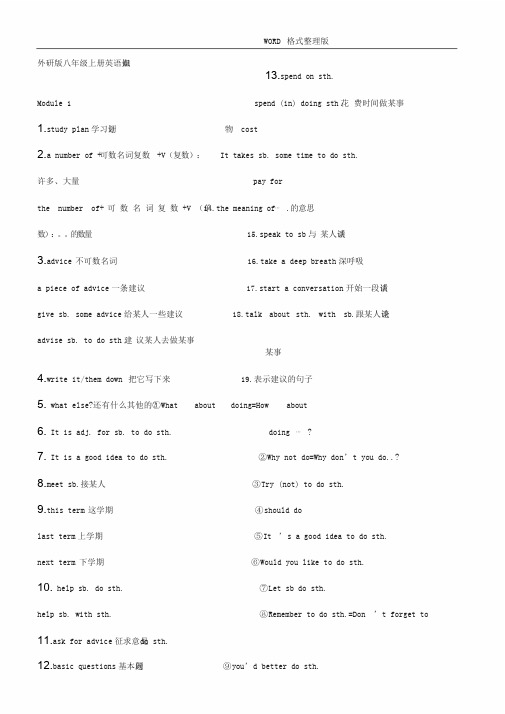
WORD 格式整理版识点外研版八年级上册英语知13.spend on sth..费时间做某事Module 1 spend (in) doing sth花1.study plan学习计划物cost2.a number of +可数名词复数+V(复数):It takes sb. some time to do sth.许多、大量pay for14.the meaning of⋯.的意思the number of+ 可数名词复数 +V (单话数):。
的数量15.speak to sb与.某人谈3.advice 不可数名词16.take a deep breath深呼吸话a piece of advice一条建议17.start a conversation开始一段谈give sb. some advice给某人一些建议18.talk about sth. with sb.跟某人谈论advise sb. to do sth建.议某人去做某事某事4.write it/them down 把它写下来19.表示建议的句子5. what else?还有什么其他的?①What about doing=How about6. It is adj. for sb. to do sth. doing ⋯?7. It is a good idea to do sth. ②Why not do=Why don’t you do..?8.meet sb.接某人③Try (not) to do sth.9.this term 这学期④should dolast term上学期⑤It ’s a good idea to do sth.next term 下学期⑥Would you like to do sth.10. help sb. do sth. ⑦Let sb do sth.help sb. with sth. ⑧Remember to do sth.=Don ’t forget to11.ask for advice征求意见d o sth.12.basic questions基本问题⑨you’d better do sth.学习好帮手***WORD 格式整理版l f其他知识点:14.lose one ’s way=lose one迷s e路15.be away from远离16. be sorry to do sth.17.listen to the radio听收音机18.write to sb.写给某人13.give up 放弃19.would like to do sth.愿意去做某事14. ask sb. to do sth让.某人去做某事20. want to do sth.15.improve oneself提高某人21. adj enough to do sth.rmation 消息信息,不可数名词22.try one’b s e s t to do sth.尽某人最大17.leave sth.落下什么东西能力去做某事18.in+一段时间(一般将来时)23. everyday (adj.) every day(adv.)19.not yet(还没有。
外研版英语八年级上册所有知识点总结

• 15.all the time 一直
Module1——重点句型
• 一、提建议的句子: • 1.You(We) should do sth • 2.Let’s do sth • 3.Why not do sth • 4.Why don’t you(we) do sth • 5.How(What) about doing
• …for …有什么用
• 4. arrive at 到达(后接小地点) • 15. take…out of… 从…拿
• 5. once or twice 偶尔,一两次
出…
• 6. go off (灯)熄灭,(闹钟)响起 • 16. go across the road=
• 7.remember to do sth 记得去做某事
• 8. in the east of 在……的东部 • 9.be famous for=be known for • 因……而闻名 • 10.such as 比如 • lions of 数百万的 • 12.on the coast 在海滨,在海岸 • 13.be popular for 因…而受欢
• 7. on one’s way to…
• cross the road 过马路
• 在某人去…的路上
• 17. see/watch/hear sb do sth
• 8. run after 追逐,追赶
看见/听见某人做过某事
• 9. stop doing sth 停止做某事 • see/watch/hear sb doing sth • 看见/听见某人正在做某事
Module 8 重点词组
• 1. in time 及时 • 2. fall off… 从…跌落 • 3. pay attention 注意 • 4. pay attention to doing sth
八年级外研版英语 上册 语法知识点汇总

八年级外研版英语上册语法知识点汇总的自我水平4.make progress取得进步5.set a goal设定目标6.work hard努力工作7.manage time管理时间8.ritize tasks优先安排任务9.review material复材料10.seek help寻求帮助11.stay motivated保持动力12.e obstacles克服障碍13.stay organized保持组织14.develop good habits养成好惯Study PlanHaving a study plan is important for students who want to make progress in their studies。
A good study plan should include a number of tasks that need to be completed within a specific timeframe。
The number of tasks should be manageable。
but enough to challenge the student。
It is also important to write down the plan and review it regularly to stay on track.When making a study plan。
it is a good idea to seek advice from teachers。
parents or other students。
They may have some basic ns that need to be addressed or can offer valuable advice on how to ritize tasks and manage time effectively。
外研八年级上知识总结

外研八年级上知识总结一、重要短语1. more and more 越来越多2. in the future 在未来3. do shopping 购物4. at the weekend 在周末5. get up 起床6. do homework 做作业7. go to bed 上床睡觉8. go to the cinema 去看电影9. on the/a weekend 在周末10. in a week 在一周内二、重点句型1. It will be + 形容词 + in + 时间段 + 表示未来某个时间点之前会发生的情况。
2. What will you do + 时间点?你将在什么时候做什么?3. How will you go to + 地点?你将如何去某地?4. Let’s + 动词原形 + 表示建议或提议。
5. What are you doing + 时间点?你正在做什么?6. When are you going + 动词不定式?你打算什么时候做某事?7. How long will it take you to do sth?做某事需要多长时间?8. It takes sb some time to do sth某人花费一些时间做某事。
9. I’m sorry to hear that听到这个消息我很难过。
10. I hope to do sth我希望做某事。
三、语法重点1. 将来时态的构成和用法。
2. 宾语从句的用法,包括连接词和语序。
3. 情态动词的用法,包括can、may、must等。
4. 现在完成时的用法,包括have/has been和have/has done的区别。
5. 形容词的比较级和最高级的用法。
6. 反身代词的用法,包括强调主语和表示强调等。
外研版)初中英语八年级上册知识点归纳总结
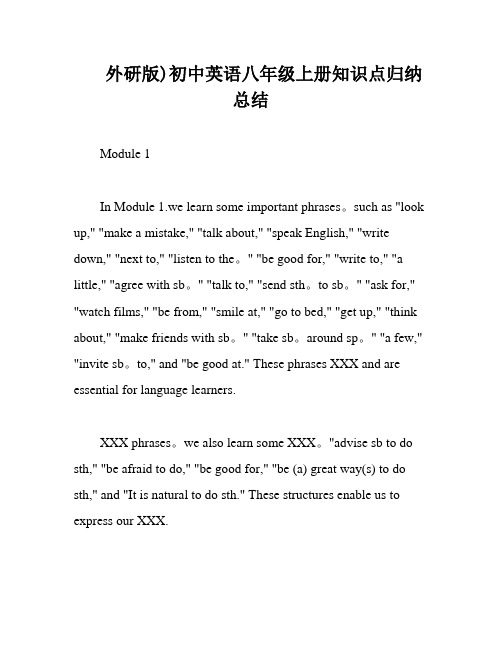
外研版)初中英语八年级上册知识点归纳总结Module 1In Module 1.we learn some important phrases。
such as "look up," "make a mistake," "talk about," "speak English," "write down," "next to," "listen to the。
" "be good for," "write to," "a little," "agree with sb。
" "talk to," "send sth。
to sb。
" "ask for," "watch films," "be from," "smile at," "go to bed," "get up," "think about," "make friends with sb。
" "take sb。
around sp。
" "a few," "invite sb。
to," and "be good at." These phrases XXX and are essential for language learners.XXX phrases。
we also learn some XXX。
"advise sb to do sth," "be afraid to do," "be good for," "be (a) great way(s) to do sth," and "It is natural to do sth." These structures enable us to express our XXX.Finally。
外研版八年级上册英语语法归纳总结

外研版八年级上册英语语法归纳总结3.形容词比较级的用法:(1)当两个人或事物(A和B)进行比较时,我们需要用到形容词的原级或者比较级①表达“A和B一样”,用as…as的结构。
公式: A+be动词+as+形容词原级+as…+Beg.: I am as tall as you.我和你一样高。
②表达“A不如B”用not as/so…as的结构。
公式:A+be动词的否定形式+as+形容词原级+as…+Beg.:I am not as tall as you.我没有你高。
③表达“A大于B”用“比较级+than”的结构。
公式:A+be动词+形容词比较级+than+B…e.g I am taller than you.我比你高。
(2)关于形容词比较级的更多用法6.副词原级的用法(1) 表示两者在某一方面程度相同时,用“as……as”结构,意为“和…一样地”。
公式:A + 实义动词 + as + 副词原形 + as + B例如:He swims as fast as I. 他和我游得一样快。
I play tennis as well as him (he dose).我网球打得和他一样好。
(2)表示两者在某一方面程度不相同时,用“not so(as)……as”结构,意为“不如,没有…”。
公式:A + 实义动词 + not+ as /so + 副词原形 + as + B例如:I can’t speak English so (as) fluently as you.我说英语不如你流利。
I can’t swim so fast as Jim.我无法游得像吉姆那么快。
*注意:在两者进行比较表示“A不如B”时,除使用“not...as/so+副词原级+as”结构外,还可以使用“less+副词原级+than”结构。
例如:He didn’t do his homework as carefully as his sister.=He did his homework less carefully than his sister.他做作业没有他妹妹认真。
(完整)外研版八年级(上册)英语语法总结,文档

一、 Module1:How to learn English一般现在时、一般过去时、一般将来时和现在进行时1.一般现在时〔 1〕定义:一般现在时表示经常或习惯性的动作或一般性事实。
〔 2〕用法:①表示事物或人物的特色、状态。
如:The sky is blue.天空是蓝色的。
②表经常屡次性发生的动作。
如:I get up at six every day. 我每天六点起床。
③表示客观现实。
如: The earth goes around the sun.地球绕着太阳转。
④表示平时的喜好。
I like bananas. We don’t like vegetables.〔 3〕构成:① be 动词:主语 +be(am,is,are)+其他。
如:I am a boy.我是一个男孩。
②行为动词:主语 +行为动词 (+ 其他 ) 。
如:Westudy English.我们学习英语。
当主语为第三人称单数 (he, she,it等)时,动词词尾有所变化。
第三人称单数动词词尾的变化有几种形式:①一般情况加-s reads, says, takes②sh、ch、s、x、o 结尾的加 -es teaches, washes, goes, misses, mixes③以辅音字母加 y 结尾的词变y为i再加-es studies, cries, carries如: Mary likes Chinese.玛丽喜欢汉语。
Miss Gu teaches us English.顾老师教我们英语。
(4〕句式变化:① be 动词的变化。
否认句:主句 +be+not+其他。
如:He is not a worker.他不是工人。
一般疑问:Be+主语 +其他。
如: -Are you a student?-Yes ,I am. / No,I’m not.特别疑问句:特别疑问词 +一般疑问句。
如: Where is my bike?② 行为动词的变化。
外研版八年级英语上册语法知识点汇总
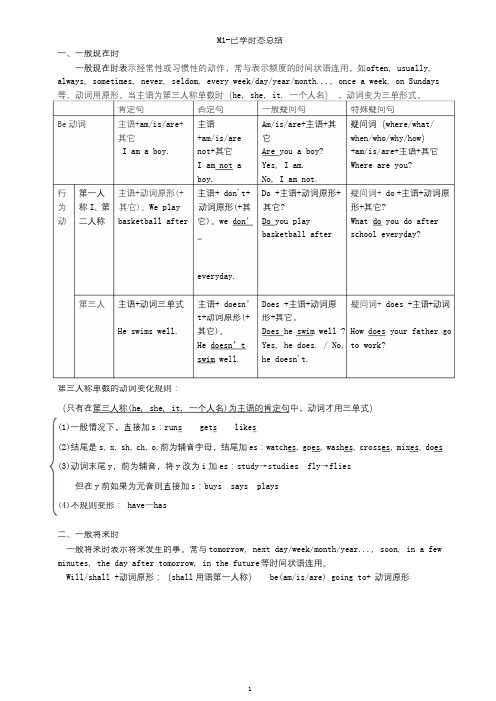
M1-已学时态总结一、一般现在时一般现在时表示经常性或习惯性的动作,常与表示频度的时间状语连用,如often, usually, always, sometimes, never, seldom, every week/day/year/month..., once a week, on Sundays 等。
动词用原形。
当主语为第三人称单数时(he, she, it , 一个人名) ,动词变为三单形式。
肯定句主语+am/is/are +主语 其它I am a boy. 否定句 一般疑问句 特殊疑问句 Be 动词 Am/is/are+主语+其 疑问词(where/what/ when/who/why/how ) +am/is/are 它 not+其它I am not aYes, I am. boy.No, I am not. 行 第一人 主语+动词原形(+主语+ don't+ Do +主语+动词原形+ 疑问词+ do +主语+动词原 Are you a boy? +am/is/are+主语+其它 Where are you? 为 称 I 、第 其它)。
We play 动词原形(+其 其它? 形+其它?动 二人称 basketball after 它)。
we don’ Do you playWhat do you do afterbasketball after school everyday? everyday.第三人 主语+动词三单式主语+ doesn’ Does +主语+动词原 疑问词+ does +主语+动词t+动词原形(+ 形+其它。
Does he swim well ? How does your father go He doesn’tYes, he does. / No, to work? swim well.he doesn't. He swims well. 其它)。
八年级上册外研版语法知识点总结
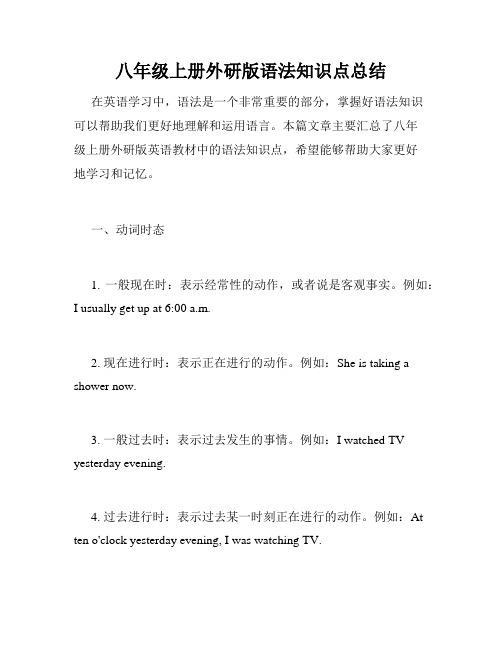
八年级上册外研版语法知识点总结在英语学习中,语法是一个非常重要的部分,掌握好语法知识可以帮助我们更好地理解和运用语言。
本篇文章主要汇总了八年级上册外研版英语教材中的语法知识点,希望能够帮助大家更好地学习和记忆。
一、动词时态1. 一般现在时:表示经常性的动作,或者说是客观事实。
例如:I usually get up at 6:00 a.m.2. 现在进行时:表示正在进行的动作。
例如:She is taking a shower now.3. 一般过去时:表示过去发生的事情。
例如:I watched TV yesterday evening.4. 过去进行时:表示过去某一时刻正在进行的动作。
例如:At ten o'clock yesterday evening, I was watching TV.5. 现在完成时:表示动作已经完成,与现在有关。
例如:Ihave finished my homework.6. 过去完成时:表示过去的某个时间点之前已经完成的动作。
例如:I had finished my homework before my mom came back.二、被动语态1. 一般被动语态:使用“be+V-ed”,表示主语是动作的接受者。
例如:The cake was made by my mom.2. 进行时被动语态:使用“be being+V-ed”,表示正在发生的被动动作。
例如:The table is being cleaned by a maid.3. 完成时被动语态:使用“have/has/had+been+V-ed”,表示动作已经完成的被动状态。
例如:The book had been read by me before.三、虚拟语气1. 虚拟语气用于表达非真实的情况,可以包括三种:①与现在事实相反:使用“were+主语”,例如:If I were you, I would buy this dress.②与过去事实相反:使用“had+V-ed”,例如:If I had known the answer, I would have told you.③表达目前可能或愿望:使用“should/would/could+V”,例如:If it should rain, we would stay at home.四、情态动词1. can/could:表示能力或者请求允许。
外研版八年级上册英语语法点汇总
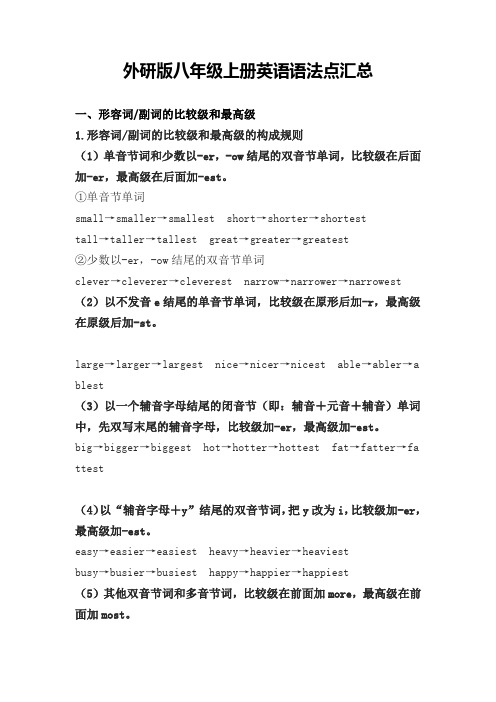
外研版八年级上册英语语法点汇总一、形容词/副词的比较级和最高级1.形容词/副词的比较级和最高级的构成规则(1)单音节词和少数以-er,-ow结尾的双音节单词,比较级在后面加-er,最高级在后面加-est。
①单音节单词small→smaller→smallest short→shorter→shortesttall→taller→tallest great→greater→greatest②少数以-er,-ow结尾的双音节单词clever→cleverer→cleverest narrow→narrower→narrowest (2)以不发音e结尾的单音节单词,比较级在原形后加-r,最高级在原级后加-st。
large→larger→largest nice→nicer→nicest able→abler→a blest(3)以一个辅音字母结尾的闭音节(即:辅音+元音+辅音)单词中,先双写末尾的辅音字母,比较级加-er,最高级加-est。
big→bigger→biggest hot→hotter→hottest fat→fatter→fa ttest(4)以“辅音字母+y”结尾的双音节词,把y改为i,比较级加-er,最高级加-est。
easy→easier→easiest heavy→heavier→heaviestbusy→busier→busiest happy→happier→happiest(5)其他双音节词和多音节词,比较级在前面加more,最高级在前面加most。
beautiful→more beautiful→most beautifuldifferent→more different→most differenteasily→more easily→most easily(6)有少数形容词、副词的比较级和最高级是不规则的,必须熟记。
good→better→best well→better→bestbad→worse→worst ill→worse→worstold→older/elder→oldest/eldestmany/much→more→most little→less→leastfar→further/farther→furthest/farthest2.形容词和副词比较级的用法(1)“甲+be+(倍数)+形容词比较级+than+乙”表示“甲比乙…”或“甲比乙…几倍”。
外研版八年级英语上知识点汇总
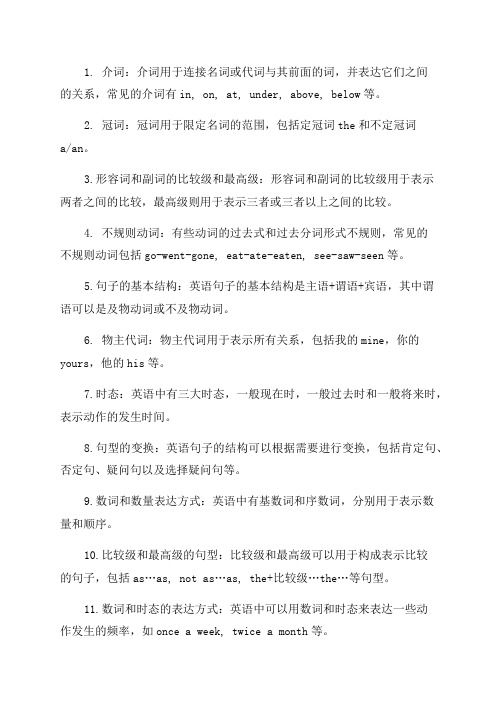
1. 介词:介词用于连接名词或代词与其前面的词,并表达它们之间的关系,常见的介词有in, on, at, under, above, below等。
2. 冠词:冠词用于限定名词的范围,包括定冠词the和不定冠词a/an。
3.形容词和副词的比较级和最高级:形容词和副词的比较级用于表示两者之间的比较,最高级则用于表示三者或三者以上之间的比较。
4. 不规则动词:有些动词的过去式和过去分词形式不规则,常见的不规则动词包括go-went-gone, eat-ate-eaten, see-saw-seen等。
5.句子的基本结构:英语句子的基本结构是主语+谓语+宾语,其中谓语可以是及物动词或不及物动词。
6. 物主代词:物主代词用于表示所有关系,包括我的mine,你的yours,他的his等。
7.时态:英语中有三大时态,一般现在时,一般过去时和一般将来时,表示动作的发生时间。
8.句型的变换:英语句子的结构可以根据需要进行变换,包括肯定句、否定句、疑问句以及选择疑问句等。
9.数词和数量表达方式:英语中有基数词和序数词,分别用于表示数量和顺序。
10.比较级和最高级的句型:比较级和最高级可以用于构成表示比较的句子,包括as…as, not as…as, the+比较级…the…等句型。
11.数词和时态的表达方式:英语中可以用数词和时态来表达一些动作发生的频率,如once a week, twice a month等。
12.情态动词:情态动词用于表示说话人的态度、意愿、能力、推测等,常见的情态动词包括can, could, may, might, must, should等。
13.虚拟语气:虚拟语气用于表示与事实相反或不可能实现的情况,包括与过去事实相反的虚拟语气以及祝愿,建议等虚拟语气。
14.被动语态:被动语态用于表达动作的承受者,句子的主语成为动作的接受者,谓语动词由"be"加上动词的过去分词构成。
外研版八年级英语上册 Module 4 Planes ships and trains知识点
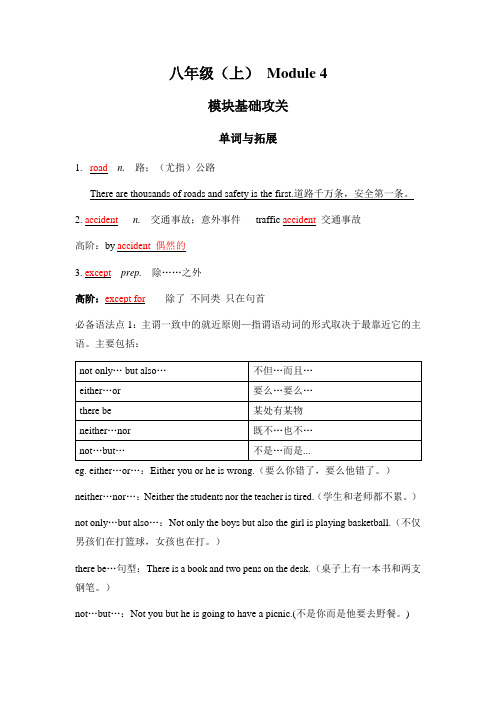
八年级(上)Module 4模块基础攻关单词与拓展1.road n. 路;(尤指)公路There are thousands of roads and safety is the first.道路千万条,安全第一条。
2. accident n. 交通事故;意外事件traffic accident交通事故高阶:by accident 偶然的3. except prep. 除……之外高阶:except for 除了不同类只在句首必备语法点1:主谓一致中的就近原则—指谓语动词的形式取决于最靠近它的主语。
主要包括:eg. either…or…:Either you or he is wrong.(要么你错了,要么他错了。
)neither…nor…:Neither the students nor the teacher is tired.(学生和老师都不累。
)not only…but also…:Not only the boys but also the girl is playing basketball.(不仅男孩们在打篮球,女孩也在打。
)there be…句型:There is a book and two pens on the desk.(桌子上有一本书和两支钢笔。
)not…but…:Not you but he is going to have a picnic.(不是你而是他要去野餐。
)就远原则是指谓语动词的形式与较远的主语保持一致。
主要包括:eg:as well as…:You as well as he are wrong.(你和他都错了。
)together with…:The students together with the teacher are tired.(学生和老师都累了。
)except…:The students except John are coming.(除了约翰,学生们都来了。
- 1、下载文档前请自行甄别文档内容的完整性,平台不提供额外的编辑、内容补充、找答案等附加服务。
- 2、"仅部分预览"的文档,不可在线预览部分如存在完整性等问题,可反馈申请退款(可完整预览的文档不适用该条件!)。
- 3、如文档侵犯您的权益,请联系客服反馈,我们会尽快为您处理(人工客服工作时间:9:00-18:30)。
M1-已学时态总结一、一般现在时一般现在时表示经常性或习惯性的动作,常与表示频度的时间状语连用,如often, usually, always, sometimes, never, seldom, every week/day/year/month..., once a week, on Sundays第三人称单数的动词变化规则:(只有在第三人称(he, she, it, 一个人名)为主语的肯定句中,动词才用三单式)(1)一般情况下,直接加s:runs gets likes(2)结尾是s, x, sh, ch, o,前为辅音字母,结尾加es:watches, goes, washes, crosses, mixes, does(3)动词末尾y,前为辅音,将y改为i加es:study→studies fly→flies但在y前如果为元音则直接加s:buys says plays(4)不规则变形: have—has二、一般将来时一般将来时表示将来发生的事。
常与tomorrow, next day/week/month/year..., soon, in a few minutes, the day after tomorrow, in the future等时间状语连用。
Will/shall +动词原形;(shall用语第一人称) be(am/is/are) going to+ 动词原形三、一般过去时一般过去时表示过去某一时候或某一段时间所发生了的事情或存在的状态。
常与过去时间yesterday,ago, this morning,just now,a moment ago,last night / year / week/month,once upon a time,the other day,before,the day before yesterday, in 1989, at the age of five, one day, then(那时), on that day, in the past连用。
四、现在进行时现在进行时表示此时此刻或现阶段正在进行的动作。
常与now, at this time, these days, Listen!动词加ing规则(1)直接在be动词后加ing. going, starting, working.(2)去掉词尾不发音的e,再加ing. leave--leaving, make---making.注意:如果单词结尾的e发音,则不能去掉,也直接加ing. see –seeing agree - agreeing .另外,有少数动词比较特殊,请用心记住:lie – lying die – dying tie – tying picnic - picnicking.(3) 对于动词只有一个元音,而其后跟了一个辅音字母时,双写末尾辅音字母再加ing.sitting, beginning run – running stop – stopping cut – cuttingcontrol – controlling一般现在时、现在进行时、一般将来时、一般过去时专项练习一单项选择题1. _____ he _____ to the park at 6:30 in the morning? No, he ____.A. Does; goes; doesB. Does; go; doesn’tC. Does; go; does2. What colour _____ you _____ this bookcase? I _____ it pink.A. are; going to paint; am going to paintB. do; paint; paintC. did; paint; painted3. Tim always _____ a picture at home. He _____ a car now. A. draws; is drawing B. draw; drawC. draws; draw4. She usually _____ her friends. They often _____ tea. A. see; drink B. sees; drinks C. sees; drink5. He usually _____ the dishes at night, but tonight he _____ clothes.A. wash; washB. washes; is going to washC. is washing; washes6. Mr. Green usually _____ his newspaper in the evening, but he and his wife _____ television yesterday evening.A. reads; watchesB. reads; is going to watchC. reads; watched7. Where are the man and the woman? They _____ near the tree. A. sit B. sat C. are sitting8. _____ your pen pal _____ diving? No, he _____ .He ______ writing stories.A. Does; like; doesn’t; likesB. Does; likes; doesn’t; likeC. Do; like; don’t; likes9. _____ you _____ fishing yesterday? No, we _____ .A. Does; go; doesn’t B. Did; go; didn’t C. Do; go; don’t10. Open the window, please. Look! He _____ it A. opens B. is openning C. is opening11. I usually _____ some milk every day. But I _____ coffee yesterday.A. drink; drankB. is drinking; drinkC. drank; am drinking12. Mr. Green often _____ his newspapers at night. But he _____ an interesting book tonight.A. reads; readsB. reads; readC. reads; is going to read13. The old man _____ playing sports in the park. He _____ morning exercise now.A. likes; is doingB. likes; doesC. like; doing14. What _____ you usually _____ in the evening? I ______ computer games.What _____ you _____ last night? I _____ a book.A. do; do; playB. did; do; playedC. does; do; playsdid; do; read do; do; read do; do; am reading15. Where ______ the boy _____? He _____ across the river now.A. does; swim; swimsB. is; swimming; is swimmingC. is; swimming; is swimming16. _____ you _____ to music now? Yes, we _____. A. Do; listen; do B. Did; listen; did C. Are; listening; are17. Put on you coat, please. OK. I ______ it on. A. am putting B. am going to put C. put18. _____ you ______ coffee? Yes, I ______. A. Do; like; do B. Did; like; did C. Are; like; am19. Look! Two cats ______ across the wall. A. run B. runs C. are running20. She _____ tea, but he _____. A. likes; doesn’t B; like; don’t C. like; doesn’t21. If it ________ tomorrow, we’ll go roller-skating. A. isn’t rain B. won’t rain C. doesn’t rain D. doesn’t fine22. Jenny ____ in an office. Her parents ____in a hospitalA work; worksB works; workC work; are workingD is working; work23. ----I don’t know if his uncle _____. ---- I think he _____ if it doesn’t rain.A will come; comesB will come; will comeC comes; comesD comes; will come24. There _____ a meeting tomorrow afternoon. A. will be going to B. will going to be C. is going to be二用动词的正确形式填空按要求变换句型。
1. Father bought me a new bike.(同义句Father bought _______ _______ ________ ________ me.2. Frank read an interesting book about history.一般疑问句_______ Frank _______ an interesting book about history?1.He’s cleaning his rooms.(划线提问)________ he _______?4. Why not go out for a walk? (同义句)_______ ________ ________ out for a walk?5. Thomas spent RMB 10 on this book. (否定句)Thomas _______ _______ RMB 10 on this book.6.My family went to the beach last week. (划线提问)________ ________ ________ family _______ last week?7.I had some friends. (一般疑问句)________ _______ have _______ friends?8.I think she is Lily’s sister. (否定句)___________________________________________9.Sally often does some reading in the morning.否定句Sally _______ often ______ some reading in the morning.10.He is a tall, thin boy. (划线提问)_______ _______ he _______ ________?11.That shirt cost 15 dollars. (就划线部分提问)______ __________ ________ that shirt cost?12.He forgot when the meeting began. (对划线部分提问)_______ ________ he _______?13.Mary doesn’t often watch football matches(肯定句)___________________________________________________M2-M4形容词副词的比较级和最高级一、形容词的比较等级和最高等级:(一)形容词的比较级和最高级的构成规则变化:1.单音节词和少数双音节词的比较级和最高级的构成2.多音节词和部分双音节词在其前面加more或 most。
